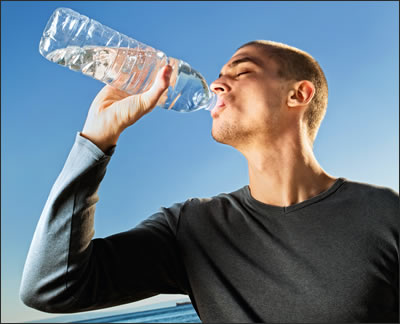How Drinking More Water Can Help You Lose Weight

For a long time, drinking water has been thought to help with weight loss. Many studies show that drinking more water may benefit weight loss but how exactly does it achieve that result?
Drinking Water Can Make You Burn More Calories
Drinking water increases the amount of calories you burn, which is known as resting energy expenditure. In adults, resting energy expenditure has been shown to increase by 24 - 30% within 10 minutes of drinking water. This lasts at least 60 minutes.
Supporting this, one study of overweight and obese children found a 25% increase in resting energy expenditure after drinking cold water. Several other studies have monitored overweight people who drank 1-1.5 litres of water daily for a few weeks. They found a significant reduction in weight, body mass index (BMI), waist circumference and body fat.
Drinking Water Before Meals Can Reduce Appetite
Some people claim that drinking water before a meal reduces appetite. There actually seems to be some truth behind this, but almost exclusively in middle-aged and older adults.
Although this may be very beneficial for middle-aged and older people, studies of younger individuals have not shown the same impressive reduction in calorie intake.
Drinking More Water is Linked to Reduced Calorie Intake and a Lower Risk of Weight Gain
Since water is naturally calorie-free, it is generally linked with reduced calorie intake. This is mainly because you then drink water instead of other beverages, which are often high in calories and sugar. Observational studies have shown that people who drink mostly water have up to a 9% (or 200 calories) lower calorie intake, on average.
How Much Water Should You Drink?
Many health authorities recommend drinking eight glasses of water (about 2 litres) per day. However, this number is completely random. As with so many things, water requirements depend entirely on the individual. For example, people who sweat a lot or exercise regularly may need more water than those who are not very active.
Older people and breast-feeding mothers also need to monitor their water intake more closely. Keep in mind that you also get water from many foods and beverages, such as tea, meat, fish, milk, and especially fruits and vegetables.
As a good rule of thumb, you should always drink water when you're thirsty, and drink enough to quench your thirst.
If you find you have a headache, are in a bad mood, are constantly hungry or have trouble concentrating, then you may suffer from mild dehydration. Drinking more water may help fix this.
Based on the studies, drinking 1-2 litres of water per day should be sufficient to help with weight loss.
Summary
Water can be really helpful for weight loss. It is 100% calorie-free, helps you burn more calories and may even suppress your appetite if consumed before meals. The benefits are even greater when you replace sugary beverages with water. It is a very easy way to cut back on sugar and calories.
However, keep in mind that you're going to have to do a lot more than just drink water if you need to lose a significant amount of weight. Water is just one, very small piece of the puzzle.

